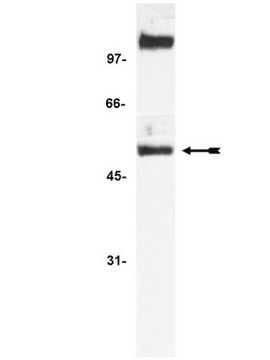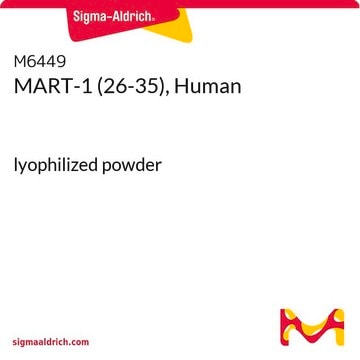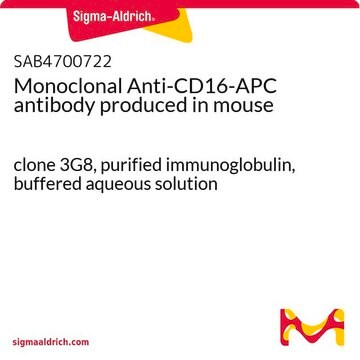SRP3321
MIF human
recombinant, expressed in insect cells, ≥98% (SDS-PAGE), ≥98% (HPLC)
Synonym(s):
GIF, GLIF, MMIF
Sign Into View Organizational & Contract Pricing
All Photos(1)
About This Item
UNSPSC Code:
12352200
NACRES:
NA.32
Recommended Products
General description
Macrophage migration inhibitory factor (MIF) is a small secreted protein that can act as a pleiotropic pro-inflammatory cytokine as well as an enzyme. MIF pro-inflammatory activity can be initiated by signaling through cluster of differentiation 74 and 44 (CD74 and CD44), resulting in the secretion of tumor necrosis-α (TNF-α), interleukins-1, -6, -8, and various matrix metalloproteinases (MMPs). The gene encoding this protein is localized on human chromosome 22q11.23. Insect cell derived recombinant MIF is a 15kDa protein containing 124 amino acid residues, including an N-terminal His-tag.
Biochem/physiol Actions
The enzymatic activity of macrophage migration inhibitory factor (MIF) is characterized by its ability to act as a tautomerase, capable of catalyzing the keto to enol isomerization of keto-phenylpyruvate and L-dopachrome. It appears as though MIF catalytic activity is dependent upon a trimeric configuration and a free N-terminal proline residue.
Physical form
Lyophilized from 10mM Sodium Phosphate, pH 7.0.
Reconstitution
Centrifuge the vial prior to opening. Reconstitute in water to a concentration of 0.1-1.0 mg/ml. Do not vortex. This solution can be stored at 2-8°C for up to 1 week. For extended storage, it is recommended to further dilute in a buffer containing a carrier protein (example 0.1% BSA) and store in working aliquots at -20°C to -80°C.
Storage Class Code
11 - Combustible Solids
WGK
WGK 3
Flash Point(F)
Not applicable
Flash Point(C)
Not applicable
Certificates of Analysis (COA)
Search for Certificates of Analysis (COA) by entering the products Lot/Batch Number. Lot and Batch Numbers can be found on a product’s label following the words ‘Lot’ or ‘Batch’.
Already Own This Product?
Find documentation for the products that you have recently purchased in the Document Library.
Crystal J DiCosmo-Ponticello et al.
Cytokine, 69(1), 47-55 (2014-07-16)
Macrophage migration inhibitory factor (MIF) is a pro-inflammatory cytokine that was initially identified by its ability to inhibit the movement of macrophages. Cell migration is a highly complex process involving changes to the cytoskeleton and cell adhesion molecules, and is
Inhibition of MIF bioactivity by rational design of pharmacological inhibitors of MIF tautomerase activity.
Dios A
Journal of Medicinal Chemistry, 45(12), 2410-2416 (2002)
Simona Cardaropoli et al.
Journal of interferon & cytokine research : the official journal of the International Society for Interferon and Cytokine Research, 34(7), 537-542 (2014-03-13)
Macrophage migration inhibitory factor (MIF) plays a pivotal role in pregnancy-related proinflammatory processes, such as placentation and labor. Differential MIF concentrations have been correlated with pathological events during pregnancy, such as recurrent miscarriages and severe pre-eclampsia (PE). The aim of
Defining minimum genomic regions of imbalance involved in testicular germ cell tumors of adolescents and adults through genome wide microarray analysis of cDNA clones.
McIntyre A
Oncogene, 23(56), 9142-9147 (2004)
Eric F Morand et al.
Frontiers in bioscience : a journal and virtual library, 10, 12-22 (2004-12-04)
Rheumatoid arthritis is characterised by the interaction of multiple mediators, among the most important of which are cytokines. In recent years, extensive data demonstrates a pivotal role for one cytokine, macrophage migration inhibitory factor (MIF), in fundamental events in innate
Our team of scientists has experience in all areas of research including Life Science, Material Science, Chemical Synthesis, Chromatography, Analytical and many others.
Contact Technical Service








